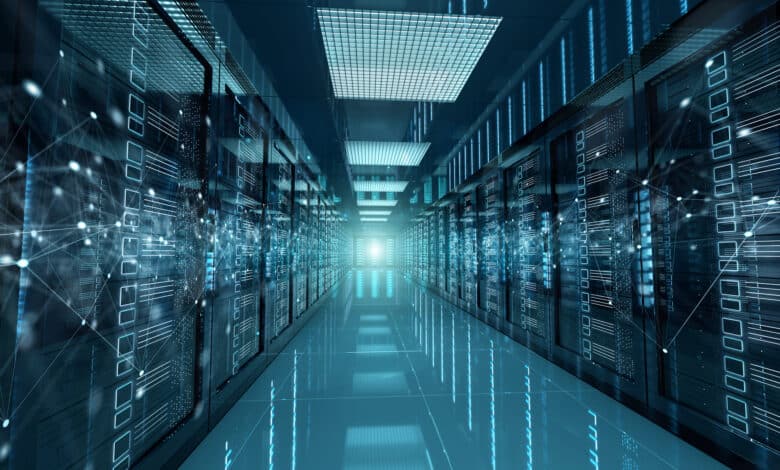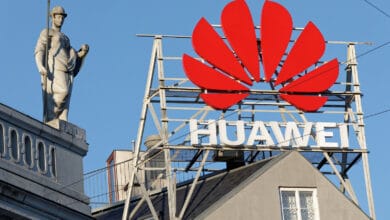
Data centers are considered to be real power guzzlers, which is not only harmful to the environment. On top of that, they cause immensely high costs in times of exploding prices for electricity and gas. This is now to come to an end. The Federal Ministry of Economics and Climate Protection (BMWK) plans to introduce stricter rules soon. However, the specifications, which are intended to make the large server facilities more environmentally friendly, are not going down well with everyone.
Targeting data centers
Anyone who takes the energy consumption of data centers lightly should take a look at Ireland. The “Emerald Isle” is considered by tech corporations like Google and Meta to be the European Mecca when it comes to operating large server facilities. This primarily has tax advantages for the US corporations. What may please the companies threatens to cripple Ireland’s power grid sooner or later, experts fear. After all, the rapidly growing server farms are true power guzzlers and are already bringing the first local energy suppliers to their knees.
What is already sad everyday life in Ireland seems to threaten in the eyes of the BMWK under the leadership of the Federal Minister of Economics Robert Habeck (Greens) also in this country. To prevent this from happening in the first place, they want to intervene in good time. Among other things, stricter requirements in the area of climate protection are to be the means of choice. This is to be made possible by the “Act on Increasing Energy Efficiency, Improving Climate Protection in Immission Control Law and Implementing EU Law”, which the Federal Ministry has already drafted. The law is to take effect as early as 2024.
Green power for data centers
The editors of iX, the magazine for professional information technology of the colleagues from heise online, has already been able to take a look at the draft law according to their own information. From this it comes out among other things that the ministry would like to specify sources of supply for the river. For example, IT systems are to obtain their electricity primarily from renewable energies. In addition, the energy efficiency of the systems plays a major role. The same applies to heat extraction. This involves using waste heat from the server systems as an energy source, for example in the area of district heating. This is also referred to as cogeneration. It also emerges from the draft that a distinction is to be made between data centers and IT operators. Since data centers are usually much larger, they should, for example, introduce an environmental management system and have it validated. Certification of the in-house energy management system would probably also be required.
More transparency for customers
Experts already fear that the project could involve a huge amount of bureaucracy. After all, specifications such as energy management are already familiar from other areas. In agriculture in particular, corresponding specifications have to be complied with. However, digitization could make everything a little easier. For example, inspections might not have to be carried out in person. Instead, the systems could send their data to the authorities digitally. A major advantage is likely to arise for IT customers for whom environmental protection is important. The information on energy efficiency is intended to ensure greater transparency for users of servers and cloud solutions. Those for whom the exclusive use of renewable energies to operate a data center is important should also be able to choose it.
- Also interesting: Alphabet may not build a data center in East Brandenburg
Electricity from 2024 to half from renewable energy
The first major changes will affect data center operators as early as January 2024, when at least 50 percent of the electricity they need is to come from renewable sources. In the following year, the electricity purchased is to be completely green. In order to be able to comply with the requirements for combined heat and power generation, the leeway for data center operators will be considerably restricted. After all, the requirements of the draft law can actually only be met by modern data centers with air or water cooling. These must then also pass on their waste heat to local companies offering district heating. Experts fear that this will make it extremely difficult for new data centers to find a suitable location.
Great criticism from Bitkom
The industry association Bitkom is also anything but satisfied with the draft. Due to what they see as questionable new regulations, it could be ensured that IT companies will leave Germany. After all, other EU countries are far more attractive. In particular, they say, the regulations on waste heat are outdated. According to Bitkom, there is currently an oversupply of waste heat on the part of data centers. Many regional energy suppliers are not convinced by district heating of data centers. After all, they feel it is too unsafe. However, since this is only a draft bill, changes to the “Act to Increase Energy Efficiency, Improve Climate Protection in Immission Control Law and Implement EU Law” are certainly still possible. We will keep you up to date.




No replies yet
Neue Antworten laden...
Gehört zum Inventar
Beteilige dich an der Diskussion in der Basic Tutorials Community →